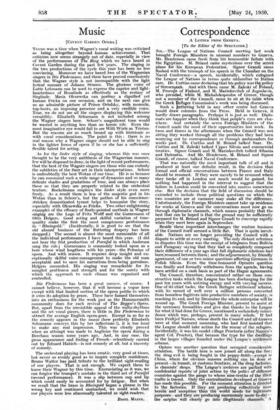Music
[COVENT GARDEN OPERA.]
Titian:: was a time when Wagner's vocal writing was criticized as being altogether beyond human achievement. That
criticism now seems strangely out of date, especially in view of the performances of The Ring which. we have heard at Covent Garden during the paSt fevi years. The singing in the two productions of the cycle this year has been no less convincing. Moreover we have heard two of the Wagnerian singers in Die Fledermaus, and these have proved conclusively that. the Wagner style _is not incompatible with the light lyrical manner of Johann Strauss. The glorious- voice of Lotte Lehmann can be used to express the caprice and light- heartedness of Rosalinde as effectively as the ecstasy of Sieglinde. Maria Olczewska can portray a dignified yet human Fricka. on one occasion, and on the next can give us an admirable picture of Prince Orlofsky, with monocle, top-boots, an imposing presence and a very credible voice. True, we do not see- all the singers displaying thig welcome versatility. Elisabeth Schumann is not included among the Wagner singers here. Schorr's magnificent tone would be wasted in anything less than an heroic role. Even the most imaginative eye would fail to see Willi. Worle as Tristan. But the reasons are as much bound up with histrionic as with vocal considerations. The point is. this : there is no real reason why a Wagner singer should not be able to sing in the lighter forms of opera if he or she hag a sufficiently flexible talent for acting.
As for the lieder style of singing, whereas this was once thought to be the very antithesis of the Wagnerian manner, few will be disposed to deny, in the light of recent performances, that the best of the Wagner singers are those who can embody the subtleties of the finer art in their interpretations. Schorr is undoubtedly the best Wotan of our time. He is so because he can command Such a wide range of dynamics and so many delicate shades and gradations of tone, and can always place these so that they are properly -related to the orchestral texture. Boekelmann employs the lieder style even more freely. As a result there is less of the majestic god in his Wotan than in Schorr's, but the pathos of his conscience- stricken domesticated tyrant helps to humanize the story, especially with Okzewska as Fricka. Two other enlightening examples of the efficacy of finely-pointed methods in Wagner singing are the Loge of Fritz Wolff and the Gurnemanz of Otto Helgers. Good acting and skilful variation of tone- quality make the first the most conspicuous performance in " Rheingold." (Incidentally, it is good to see that the old absurd business of the fluttering drapery has been dropped.) The second is almost the most memorable of all the individual performances I have heard this year. (I did not hear the first production of Parsifal in which Andresen sang the role.) Gurnemanz is commonly looked upon as a bore whose wind lengthens with his years—the Polonius of opera. And with reason. It requires deep insight and ex- ceptionally skilful voice-management to make the old man acceptable and to save his narrations from being garrulous. Helgers succeeded. His singing was remarkable for its mingled gentleness and strength and for the surety with which the approach to each climax was organized and controlled.
Die Fledermaus has been a great success, of course. I cannot believe, however, that it will become a vogue here except with that limited section of the opera public to which it owes its adoption by grace. These have fanned themselves into an enthusiasm for the work just as the Hammersmith community does for each revival of The Beggar's Opera. But, apart from the irresistible appeal of the waltz-rhythms and the set vocal pieces, there is little in Die Fledermaus to attract the average English opera-goer. Except in so far as the comedy appears in the music (how perfectly Elisabeth Schumann conveys this by her inflections !), it is too local to make any real impression. This was clearly proved when an attempt was made to Anglicize the opera during a Beecham season some years ago. And, in any case, the gross appearance and fooling of Frosch—relentlessly carried out by Eduard Habich—is not comedy at all, but a travesty of comedy.
The orchestral playing has been erratic, very good at times, but never so evenly good as to inspire complete confidence. Bruno Walter has paid tribute to the brilliant sight-reading of our players. That is not enough. We expect them to know their Wagner by this time. Excruciating as it was, we can forgive the trumpet's mistake in the third act of Parsifal (second performance). It was a slip between cup and lip which could easily be accounted for by fatigue. But when we recall that the brass in Rheingold began a phrase in the wrong key and continued unabashed, we could wish that our players were less abnormally talented as sight-readers.
BASIL MAINE.






































 Previous page
Previous page